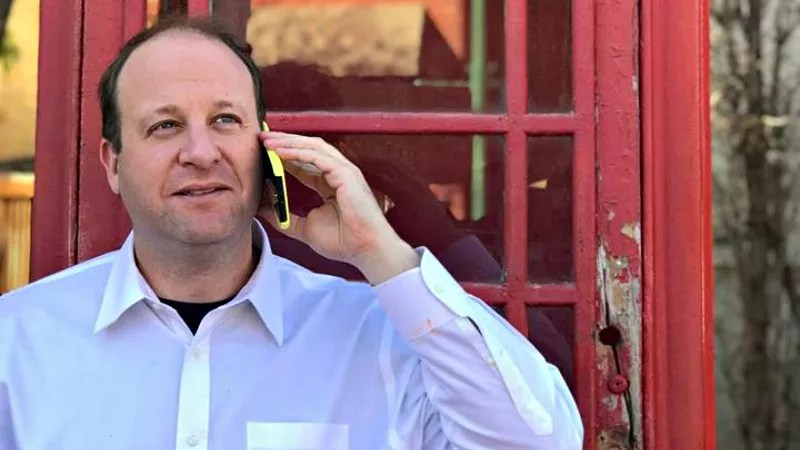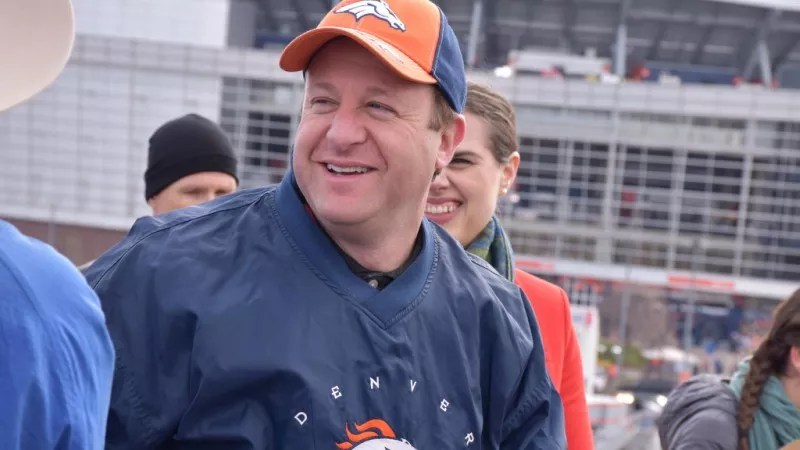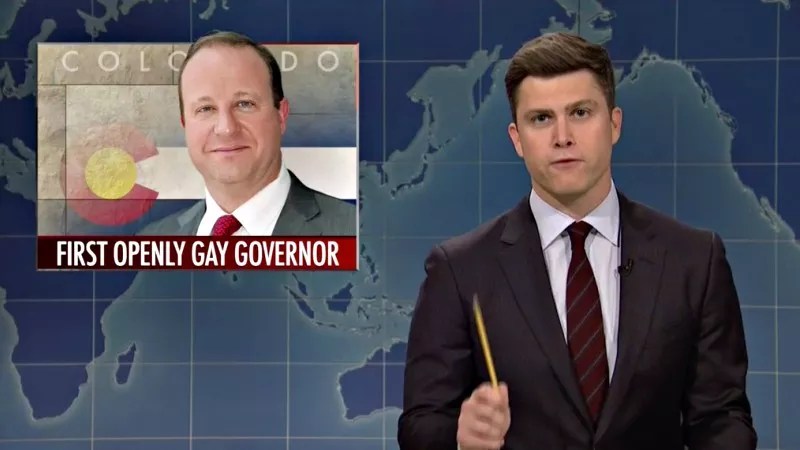

Audio By Carbonatix
Last week, Representative Jared Polis easily outdistanced Treasurer Walker Stapleton in the race for Colorado governor, riding a blue wave that resulted in Democrats winning every major statewide office and taking back control of the Colorado senate.
But for Polis, the celebrations are already over. The first five words out of his mouth at the outset of Westword‘s interview with the governor-elect are, “Lot of work to do.”
With that in mind, the Polis forces have already launched a website, dubbed Boldly Forward, that includes information about his extremely eclectic transition team and encouragement for average folks to get involved with the preparations for a stint in office that he says he intends to make as productive as possible.
Nonetheless, Polis took a few minutes on November 13 to discuss what his victory says about Colorado voters today; his willingness to engage with leaders who don’t agree with him (including one transition-team member whose past stands on education are leagues away from his own); the reaction to his win by the national media; his view of the “openly gay” label at the heart of a Colin Jost riff from the most recent edition of Saturday Night Live; whether he would support fracking-related legislation or boosts to education funding following the ballot failures of Proposition 112 and Amendment 73; and if the scope of the Democrats’ triumph makes it even more important that he and other officials affiliated with the party turn their words into deeds.
Westword: Even some of your Democratic challengers during the primary campaign suggested that you were too liberal to be elected to statewide office. Obviously, that proved not to be true. Do you think your victory is a reflection of where the electorate is right now? Or does it suggest that the too-liberal label placed on you wasn’t accurate?
Jared Polis: I’m excited to have run for governor and now be challenged with implementing bold ideas that will do big things for our state. They’re not always going to be liberal or conservative ideas. It doesn’t matter if they’re from the left or the right. We just want to think out of the box and move forward. When you challenge the status quo, of course there’s a pushback from some of the insiders. But I think people of the state overwhelmingly wanted to give me a chance to get big things done for our state.
[Here’s a video of Polis’s election-night acceptance speech.]
Since the election, the question of whether Colorado is no longer a purple state and is now simply a blue state has been raised a lot. What are your thoughts on that?
Colorado is a very purple state, in that the Republican and Democratic voters are about equal. There are close to equal numbers registered on both sides. But the unaffiliated voters chose overwhelmingly to give me the opportunity to lead and move forward with some of the big ideas we talked about in the campaign, like more renewable energy, full-day kindergarten for kids and saving people money for health care.
On the subject of ideas that may not be Democratic or Republican, your transition committee has a number of folks who definitely wouldn’t be considered liberals. Do you subscribe to the “team of rivals” idea, where you want to hear from people who disagree with you as well as those who already agree with you?
Absolutely. We did set up a transition committee for the whole state. In January, I have the opportunity to be everybody’s governor. It doesn’t matter if someone voted for me or not. So we tried to get geographic representation, Republicans and Democrats, conservatives and liberals, and diversity in many ways. We wanted to have a transition team that would really help prepare me to be an effective governor for every Coloradan.
One of the people on your transition team on the Republican side is former Congressman Bob Schaffer, and he is certainly very conservative. In past elections, he’s advocated on behalf of vouchers for private and parochial schools and backed a constitutional amendment to allow school prayer. These aren’t positions you hold. Do you like the idea of someone with those beliefs advising you where things should go education-wise in the future?
These are, as you know, transition-advisory team members, so they will help us hire the senior-level people. Of course, there are people in the state who will see their own viewpoints represented in the transition team, and who might not have voted for me. But for me to be an effective governor for everybody, we want to include people who I might not necessarily agree with. We need to deliver on making the schools of this state more effective. We really have an operations focus, and we want to make sure we don’t put ideology ahead of efficiency.

Jared Polis has certainly had a better month than have the Denver Broncos.
Did anyone who you asked to be on the transition committee say no? Or were even those folks who may not share all of your positions open to the idea of being involved?
They were generally pretty happy to be on it, although we did have some caveats. We don’t have any lobbyists on our committee, and there were a few folks we had originally thought of that, when we found out they were lobbyists, we couldn’t include them. But generally speaking, people are thrilled to give back to this great state. Republicans, Democrats, independents – we all love Colorado. So far, people have been happy to give of their time to be part of the transition and make it effective. Again, whether people voted for me or not, they want the state to be effective and they want my governorship to be effective. I’m going to do my best to be effective.
After your election, the national media has focused on you being the first gay governor of a U.S. state. You certainly acknowledged the possibility of making history during the campaign, but it wasn’t a central focus. Does it strike you as surprising that it’s gotten so much attention?
I find it sort of entertaining. When I was first elected to Congress, I had the same thing. There was all of this publicity – I think I was the first openly gay man to be elected to Congress. Although other people had come out, there was a big wave of attention just like there is now. But obviously, that’s not on the mind of Colorado voters. When I travel our state, they’re interested in what are our plans to improve our roads and how are we going to get to 100 percent renewable energy, how we can improve our schools.
It says two things nationally. It shows how far we’ve come, but also how far we still have to go. How far we’ve come in the sense that this is great, and if it inspires LBGTQ individuals and supporters in areas of the country that aren’t as progressive and could use a morale boost when they’re under fire, that’s wonderful. But it also shows how far we’ve got to go that this is even news. Hopefully we’ll reach a point in time where who you love doesn’t even make the front pages nationally, because it’s just another dimension of our human diversity.
On the subject of how far we’ve come as a state, 2017 marked 25 years since the passage of Amendment 2, which resulted in Colorado being branded as “the hate state.” In that sense, do you see your election as a marker of sorts?
I think for a lot of people that have been involved with the equality movement for a long time or people who felt discriminated against in that fight, my election can be a form of closure for a state that’s come full circle in terms of embracing all aspects of diversity. I think it’s also very good for the Colorado brand – to show that we’re an inclusive state, to show that we want the best and hardest-working people from across the country and across the world to be able to contribute to our great state regardless of their race or country of origin or who they are or who they love.

Colin Jost earns laughs from Jared Polis’s election and the term “openly gay.”
NBC via Facebook
You tweeted about being mentioned on Saturday Night Live, where Colin Jost had fun with the term “openly gay.” Does that phrase stick out in a strange way for you, too? Does it seem antiquated, in your view?
I don’t have any deep thoughts on it. But I do think that, to a certain extent, it is. I think people who served in public office in the nineteenth and early twentieth century, if they were gay, they were not open about it; they were closeted. So I think it’s an acknowledgment that while we may be breaking ground, we don’t want to diminish that there could very well have been people who were gay or lesbian and served in the past but weren’t at a point in time where they could be open about it. I think that’s what they’re getting at.
It is a little bit of a relic, so I don’t expect it will be used too far into the future other than in a historic context, acknowledging that there may have been gay people who served, but just not openly.
Among measures on the ballot this time around, voters rejected Proposition 112, concerning setbacks for oil-and-gas projects. What might you encourage the legislature to do on this subject, since you’ve been outspoken about fracking in the past?
We’re going to work with legislators, the oil and gas industry, environmental groups and local governments to try to formalize the parameters of local control and make sure we put health and safety first.
What was your position on Proposition 112?
I was against it.
What were your reasons for being against it? Was it too large a step, from your perspective?
I seek a more nuanced solution. We want to make sure we can empower local communities to address surface conflicts. But we also want to continue to work with any industry to create good jobs in our state and grow our economy.
You’re known as a businessman. In terms of moving forward, it is important to you that Colorado has a reputation for being business-friendly, which some people felt that the passage of Proposition 112 would have contradicted?
Part of being attractive to businesses is reducing health-care costs. That’s usually the first or second thing I hear from small-business owners. Certainly in some cases, they think of individual health care as a big burden for businesses, since they pay for a big part of it. But we also want to protect our environment and put health and safety first and work with any industry to create jobs.
The voters also rejected Amendment 73, which would have generated more money for education. Do you feel the legislature may be able to find a way to earmark more money for education? Or do you feel frustrated with TABOR [The Taxpayer’s Bill of Rights, authored by Douglas Bruce] like some legislators, who feel that the law ties their hands?
The big fiscal decisions in our state are reserved for the voters. If there’s a significant new investment for roads or for schools, that will have to flow through the voters. But I’m cautiously optimistic about our ability to deliver on full-day kindergarten for kids in Colorado.
The election put Democrats in control of all the major state offices, as well as both houses of the legislature. Does that put pressure on you as governor to make sure things get done? And what will be your approach to make sure progress is made?
We have an opportunity to show we can deliver real results for middle-class families and all Coloradans – actually save them money on health care, move from half-day to full-day kindergarten, and show that we can move toward renewable energy and create good green jobs.
Our challenge is implementing the mandate that I ran on, which overlapped with the mandate that many members of our state legislature ran on, as well as setting up a state government that focuses on operations and delivering services to Coloradans as efficiently as possible.